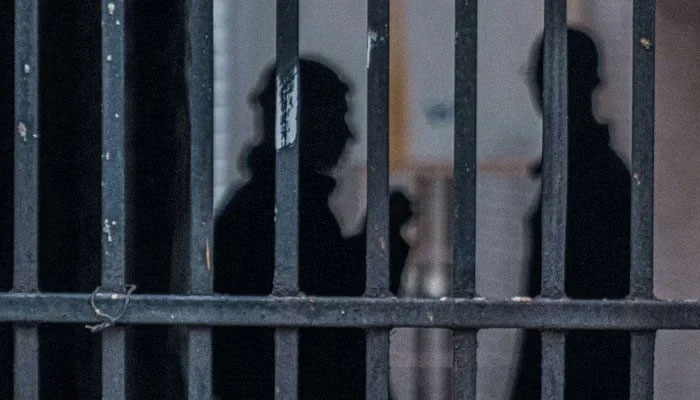Jail term, fine for tax evasion, fraud
FBR on Wednesday issued updated version of Sales Tax Act 1990 and FED 2005 up to June 30, 2024 approved by parliament
ISLAMABAD: The Federal Board of Revenue (FBR) has issued amended Sales Tax Act 1990 for establishing the Tax Fraud Investigation Wing-Inland Revenue to detect, investigate and prevent tax frauds.
The FBR on Wednesday issued updated version of Sales Tax Act 1990 and the Federal Excise Duty (FED) 2005 up to June 30, 2024 approved by parliament.
According to the updated version of Sales Tax Act 1990, the FBR would charge 25 percent General Sales Tax (GST) on the import of mobile phones or satellite phones on the basis of import value (exceeding $500) per set, or equivalent value in rupees in case of supply by the manufacturer.
The 25 percent sales tax would be applicable on mobile phones in Completely Built Unit (CBU) condition at the time of import or registration (IMEI number by CMOs). The FBR would charge 18 percent sales tax on phones where value is not exceeding $500 18% ad valorem.
The rate of sales tax would be 18 percent on import in CKD/ SKD condition and supply of locally manufactured mobile phones in CBU condition for both the values not exceeding $500 or exceeding $500.
The revised and updated version of General Sales Tax Act incorporated the new definition of “tax fraud” which means intentionally understating or underpaying the tax liability or overstating the entitlement to tax credit or tax refund in contravention of duties or obligations imposed under this Act by way of submission of false return, statements or false documents or withholding of correct information or documents to cause loss of tax.
The FBR has established the Tax Fraud Investigation Wing-Inland Revenue. The functions of the wing would be to detect, analyse, investigate, combat and prevent tax fraud. It would comprise Fraud Intelligence and Analysis Unit, Fraud Investigation Unit, Legal Unit, Accountants Unit, Digital Forensic and Scene of Crime Unit, Administrative Unit, etc.
The updated Sales Tax Act revealed that the FBR could require any person or class of persons to integrate their electronic invoicing system with the board’s computerised system for real time reporting of sales.
Any person who submits a false or forged document to any officer of Inland Revenue; or destroys, alters, mutilates or falsifies the records including a sales tax invoice; or knowingly or fraudulently makes false statement, such person would pay a penalty of Rs25,000 or 100 percent of the amount of tax evaded or sought to be evaded, whichever is higher.
He would also be liable to up to five years jail if the tax evaded or sought to be evaded is less than Rs one billion. The sentence would extend to up to ten years if the tax evaded or sought to be evaded is Rs one billion and above, and a fine which may extend to an amount equal to the amount of tax evaded or sought to be evaded, or with both.
The person who commits, causes to commit, or attempts to commit the tax fraud would pay a penalty of Rs25,000 or 100 percent of the amount of tax evaded or sought to be evaded, whichever is higher. He would also be liable to up to jail term and fine equivalent to those of tax evaders.
-
 Halsey's Fiance Avan Jogia Shares Rare Update On Wedding Planning
Halsey's Fiance Avan Jogia Shares Rare Update On Wedding Planning -
 Instagram Head Adam Mosseri Says Users Cannot Be Clinically Addicted To App
Instagram Head Adam Mosseri Says Users Cannot Be Clinically Addicted To App -
 James Van Der Beek Was Working On THIS Secret Project Before Death
James Van Der Beek Was Working On THIS Secret Project Before Death -
 Las Vegas Father Shoots Daughter's Boyfriend, Then Calls Police Himself
Las Vegas Father Shoots Daughter's Boyfriend, Then Calls Police Himself -
 'Hunger Games' Star Jena Malone Shocks Fans With Huge Announcement
'Hunger Games' Star Jena Malone Shocks Fans With Huge Announcement -
 Ex-OpenAI Researcher Quits Over ChatGPT Ads
Ex-OpenAI Researcher Quits Over ChatGPT Ads -
 Prince William Criticized Over Indirect Epstein Connection
Prince William Criticized Over Indirect Epstein Connection -
 'Finding Her Edge' Creator Explains Likeness Between Show And Jane Austin Novel
'Finding Her Edge' Creator Explains Likeness Between Show And Jane Austin Novel -
 Margot Robbie Delivers Sweet Message Ahead Of Valentine's Day
Margot Robbie Delivers Sweet Message Ahead Of Valentine's Day -
 How AI Boyfriends Are Winning Hearts In China: Details Might Surprise You
How AI Boyfriends Are Winning Hearts In China: Details Might Surprise You -
 Blake Lively Mocked Over 'dragons' After Latest Court Appearance
Blake Lively Mocked Over 'dragons' After Latest Court Appearance -
 Gmail For Android Now Lets Users Create Labels On Mobile
Gmail For Android Now Lets Users Create Labels On Mobile -
 Emma Slater Reveals Final Moments With James Van Der Beek Before His Death
Emma Slater Reveals Final Moments With James Van Der Beek Before His Death -
 Princess Kate Makes Surprise Visit To Support Mental Health Initiative
Princess Kate Makes Surprise Visit To Support Mental Health Initiative -
 Reese Witherspoon Sparks Nostalgia With 'Green Sisters' Tribute To Jennifer Aniston
Reese Witherspoon Sparks Nostalgia With 'Green Sisters' Tribute To Jennifer Aniston -
 Royal Family Faces Fresh Crisis While Andrew's Controversy Refuses To Die
Royal Family Faces Fresh Crisis While Andrew's Controversy Refuses To Die




